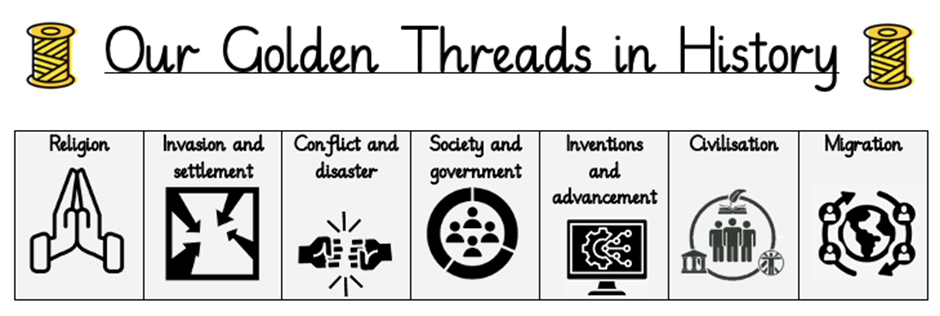History
At Oakthorpe, the teaching of history forms part of our broad and balanced curriculum. We aim for all children to gain the skills required to develop a coherent knowledge and understanding of Britain’s past and that of the wider world. We aim to inspire pupils’ curiosity to know more about the past. We want our pupils’ to be curious and passionate about history by asking why things have happened, and through enquiry, having the opportunity to form their own opinions. They will demonstrate knowledge, have an understanding of the past and consider how history has shaped the present and will shape their future. This provides our children with the opportunity to think like a historian and learn from actions and outcomes of the past. Topics are informed by the national curriculum and are sensitive to children’s interests.
The history curriculum at Oakthorpe is carefully planned and structured to ensure that current learning is linked to previous learning.
By the end of year 6 we aim:
- For children to gain a coherent knowledge and understanding of Britain’s past and that of the wider world which helps to stimulate pupils’ curiosity to know more about the past.
- For children to have a wider, more detailed and chronologically secure knowledge.
- For children to ask perceptive questions, think critically, weigh evidence, sift arguments, develop perspective and judgment and be able to justify and explain.
- For children to begin to understand the complexity of people’s lives, the process of change, the diversity of societies and relationships between different groups, as well as their own identity and the challenges of their time.
- For children to have a respect for historical evidence and the ability to explore the many causes that led to events and changes in history, taking consideration of the outcomes which may have been intended or unintended.
The following six key disciplinary concepts sit at the core of our curriculum to ensure the defining characteristics of the subject are ever-present.
- Chronological understanding
- Continuity and change
- Cause and consequence
- Similarity and difference
- Historical significance
- Evidence and interpretation
We have identified a set of key substantive concepts (golden threads) that children will repeatedly revisit throughout their time at Oakthorpe.

An Oakthorpe Historian will:
Use clues to study the past.
Ask important questions.
Use and sort evidence.
Think critically by questioning evidence.
Compare, analyse and evaluate.
Develop socially responsible and informed attitudes.
Retrieval
 • Deliberate recall of information to boost learning and reduce forgetting.
• Deliberate recall of information to boost learning and reduce forgetting.
• Low stakes testing and spaced recall practise to improve understanding.
 Support
Support
• Small steps within lessons ensure all children have the opportunity to make progress.
• Children with SEND have specific targeted support according to guidance based on individual needs.
